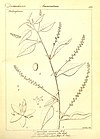Note: This is a project under development. The articles on this wiki are just being initiated and broadly incomplete. You can Help creating new pages.
Difference between revisions of "Digera muricata"
(→References) |
|||
| Line 69: | Line 69: | ||
<ref name="chemical composition">[Chemistry]</ref> | <ref name="chemical composition">[Chemistry]</ref> | ||
<ref name="Leaf">[Morphology]</ref> | <ref name="Leaf">[Morphology]</ref> | ||
| − | <ref name="Common names">[https://sites.google.com/site/indiannamesofplants/via-species/d/digera- | + | <ref name="Common names">[https://sites.google.com/site/indiannamesofplants/via-species/d/digera-muricata Common names]</ref> |
<ref name="How to plant/cultivate">[Cultivation]</ref> | <ref name="How to plant/cultivate">[Cultivation]</ref> | ||
Revision as of 17:03, 22 June 2020
Digera muricata is an annual herb growing up to 70 cm tall. Often gathered from the wild for local use as a food in some areas it is also cultivated and sold in local markets.
Contents
- 1 Uses
- 2 Parts Used
- 3 Chemical Composition
- 4 Common names
- 5 Properties
- 6 Habit
- 7 Identification
- 8 List of Ayurvedic medicine in which the herb is used
- 9 Where to get the saplings
- 10 Mode of Propagation
- 11 How to plant/cultivate
- 12 Commonly seen growing in areas
- 13 Photo Gallery
- 14 References
- 15 External Links
Uses
Indigestion, Urinary disorders.
Parts Used
Leaves, Young shoots, Flowers.
Chemical Composition
Common names
| Language | Common name |
|---|---|
| Kannada | ಚೆಂಚಲಿಸೊಪ್ಪು Chenchalisoppu, ಗೊರಜೆಪಲ್ಲೆ Gorajepalle |
| Hindi | Chanchali |
| Malayalam | |
| Tamil | Toyya kirai |
| Telugu | Chenchalicettu |
| Marathi | |
| Gujarathi | Kanjaro |
| Punjabi | NA |
| Kashmiri | NA |
| Sanskrit | |
| English | False Amaranth |
Properties
Reference: Dravya - Substance, Rasa - Taste, Guna - Qualities, Veerya - Potency, Vipaka - Post-digesion effect, Karma - Pharmacological activity, Prabhava - Therepeutics.
Dravya
Rasa
Guna
Veerya
Vipaka
Karma
Prabhava
Habit
Identification
Leaf
| Kind | Shape | Feature |
|---|---|---|
Flower
| Type | Size | Color and composition | Stamen | More information |
|---|---|---|---|---|
| {{{5}}} |
Fruit
| Type | Size | Mass | Appearance | Seeds | More information |
|---|---|---|---|---|---|
Other features
List of Ayurvedic medicine in which the herb is used
Where to get the saplings
Mode of Propagation
How to plant/cultivate
A very adaptable plant, it occurs naturally in both tropical and subtropical regions, where it can be found in semi-arid through to quite moist areas.[4]
Commonly seen growing in areas
Most common on disturbed, Waste ground, Savannah, Semi desert, Mud soils.
Photo Gallery
References
- ↑ [Chemistry]
- ↑ Common names
- ↑ [Morphology]
- ↑ [Cultivation]
External Links
- Pages using duplicate arguments in template calls
- Ayurvedic Herbs known to be helpful to treat Indigestion
- Ayurvedic Herbs known to be helpful to treat Urinary disorders
- Herbs with Leaves used in medicine
- Herbs with Young shoots used in medicine
- Herbs with Flowers used in medicine
- Herbs with common name in Kannada
- Herbs with common name in Hindi
- Herbs with common name in Tamil
- Herbs with common name in Telugu
- Herbs with common name in Gujarathi
- Herbs with common name in English
- Habit - Annual
- Index of Plants which can be propagated by Seeds
- Herbs that are commonly seen in the region of Most common on disturbed
- Herbs that are commonly seen in the region of Waste ground
- Herbs that are commonly seen in the region of Savannah
- Herbs that are commonly seen in the region of Semi desert
- Herbs that are commonly seen in the region of Mud soils
- Herbs
- Pages without herbs images





